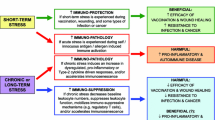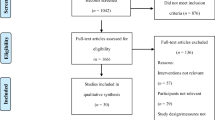Abstract
The current randomized controlled study employed a mixed methods approach to better elucidate the benefits of mindfulness meditation for stress management among healthy older adults. Ninety-six older adults were randomly assigned to either a mindfulness-based intervention (MBI, n = 57) or a reading and relaxation program (RRP, n = 39). Participants completed the stress profile pre- and post-intervention and a series of open-ended questions post-intervention for qualitative analysis. Results suggest that both groups displayed improvements from baseline for perceived hassles, global health habits, and psychological wellbeing. Between-groups differences at post-intervention were only found for threat minimization, with the MBI group displaying a relative increase in this coping strategy relative to the RRP group. Results were not moderated by baseline perceived stress. Qualitative benefits and challenges of each program were identified. Current findings contribute to the scarce literature examining mindfulness in older adults and suggest that employing a mixed -methods approach can help to more accurately evaluate the benefits of mindfulness training in this population.





Similar content being viewed by others
References
Arif, M., Sadlier, M., Rajenderkumar, D., James, J., & Tahir, T. (2017). A randomized controlled study of mindfulness meditation versus relaxation therapy in the management of tinnitus. Journal of Laryngology and Otology, 131, 501–507.
Bath, P. A., & Deeg, D. (2005). Social engagement and health outcomes among older people: introduction to a special section. European Journal of Ageing, 2(1), 24–30.
Bernstein, D. A., Borkovec, T. D., & Hazlett-Stevens, H. (2000). New directions in progressive relaxation training: a guidebook for helping professionals. Westport: Praeger.
Cohen, S., Kamarch, T., & Mermelstein, R. (1983). A global measure of perceived stress. Journal of Health and Social Behavior, 24(4), 385–396.
Coll-Planas, L., Myqvist, F., Puig, T., Urrutia, G., Sola, I., & Monteserin, R. (2017). Social capital interventions target older people and their impact on health: a systematic review. Journal of Epdemiology and Commuity Health, 71(7), 663–672.
Creswell, J.J., Irwin, M.R., Burklund, L.J., Lieberman, M.D., Arevalo, J.M.G., Ma, J., Breen, E.C., & Cole, S.W. (2012). Mindfulness-based stress reduction training reduces loneliness and pro-inflammatory gene expression in older adults: A small randomized controlled trial. Brain, Behavior, and Immunity, 26, 1095–1101.
Das, A. (2013). Spousal loss and health in late life: moving beyond emotional trauma. Journal of Aging and Health, 25(2), 221–242.
Finucane, A., & Mercer, S. W. (2006). An exploratory mixed methods study of the acceptability and effectiveness of mindfulness-based cognitive therapy for patients with active depression and anxiety in primary care. BMC Psychiatry, 6(1), 1–14.
Fiocco, A., & Mallya, S. (2015). The importance of cultivating mindfulness for cognitive and emotional well-being in late life. Journal of Evidence Based Complementary & Alternative Medicine, 20(1), 35–40.
Fredrickson, B. L., & Branigan, C. (2005). Positive emotions broaden the scope of attention and thought-action repertoires. Cognition & Emotion, 19(3), 313–332.
Gallin, J.I., & Ognibene, F.P. (2012). Principles and practice of clinical research. Academic Press.
Geiger, P. J., Boggero, I. A., Brake, C. A., Caldera, C. A., Combs, H. L., Peters, J. R., & Baer, R. A. (2016). Mindfulness-based interventions for older adults: a review of the effects on physical and emotional well-being. Mindfulness, 7(2), 296–307.
Glenn, G. (2007). Retirement: effects of a psychoeducation program. Psychology. Gold Coast, Queensland,Australia, Bond University. Doctor of Philosophy.
Goyal, M., Singh, S., Sibinga, E. M. S., Gould, N. F., Rowland-Seymour, A., Sharma, R., et al. (2014). Meditation programs for psychological stress and well-being: a systematic review and meta-analysis. JAMA Internal Medicine, 174(3), 357–368.
Grossman, P., Niemann, L., Schmidt, S., & Walach, H. (2004). Mindfulness-based stress reduction and health benefits: a meta-analysis. Journal of Psychosomatic Research, 57(1), 35–43.
Hayes-Skelton, S. A., Roemer, L., & Orsillo, S. M. (2013). A randomized clinical trial comparing an acceptance based behavior therapy to applied relaxation for generalized anxiety disorder. Journal of Consulting & Clinical Psychology, 81(5), 761–773.
Hohaus, L. C., & Spark, J. (2013). Getting better with age: do mindfulness and psychological wellbeing improve in old age? European Psychiatry, 28, 1–1.
IBM Corp. (2013). IBM SPSS Statistics for Windows, Version 22.0. Armonk, NY: IBM Corp.
Jain, S., Shapiro, S. L., Swanick, S., Roesch, S. C., Mills, P. J., Bell, I., & Schwartz, G. E. (2007). A randomized controlled trial of mindfulness meditation versus relaxation training: effects on distress, positive states of mind, rumination, and distraction. Annals of Behavioral Medicine, 33(1), 11–21.
Kabat-Zinn, J. (1990). Full catastrophe living. New York: Dell Publishing.
Kahana, E., Kahana, B., & Lee, J. E. (2014). Proactive approaches to successful aging: one clear path through the forest. Gerontology, 60(5), 466–474.
Lutz, A., Slagter, H. A., Dunne, J. D., & Davidson, R. J. (2008). Attention regulation and monitoring in meditation. Trends in Cognitive Sciences, 12(4), 163–169.
Mallya, S., & Fiocco, A. J. (2015). Effects of mindfulness training on cognition and well-being in healthy older adults. Mindfulness, 7(2), 453–465.
Morone, N. E., Greco, C.M. & Weiner, D.K. (2008). Mindfulness meditation for treatment of chronic low back pain in older adults: a randomized controlled pilot study. Pain, 134(3), 310–319.
Moynihan, J. A., Chapman, B. P., Klorman, R., Krasner, M. S., Duberstein, P. R., Brown, K. W., & Talbot, N. L. (2013). Mindfulness-based stress reduction for older adults: effects of executive function, frontal alpha asymmetry and immune function. Neuropsychobiology, 68, 34–43.
Mularski, R. A., Munjas, B. A., Lorenz, K. A., Sun, S., Robertson, S. J., Schmelzer, W., Kim, A. C., & Shekelle, P. G. (2009). Randomized controlled trial of mindfulness-based therapy for dyspnea in chronic obstructive lung disease. The Journal of Alternative and Complementary Medicine, 15, 1083–1090.
Nordenmark, M., & Stattin, M. (2009). Psychosocial well-being and reasons for retirement in Sweden. Ageing and Society, 29(3), 413–430.
Nowack, K. (1990). Initial development of an inventory to assess stress and health risk. American Journal of Health Promotion, 4(3), 173–180.
Nowack, K. (2013). Coaching for stress: StressScan. Psychometircs in Coaching, J. Passmore, United Kingdom: 305–324.
Palta, P., Page, G., Piferi, R. L., Gill, J. M., Hayat, M. J., Connolly, A. B., & Szanton, S. L. (2012). Evaluation of a mindfulness-based intervention program to decrease blood pressure in low-income African-American older adults. Journal of Urban Health, 89(2), 308–316.
QSR International Pty Ltd. (2012). NVivo qualitative data analysis Software; Version 10.
Rahl, H. A., Lindsay, E. K., Pacilio, L. E., Brown, K. W., & Creswell, J. D. (2017). Brief mindfulness meditation training reduces mind wandering: the critical role of acceptance. Emotion, 17(2), 224–230.
Richardson, V. E., Bennett, K. M., Carr, D., Gallagher, S., Kim, J., & Fields, N. (2015). How does bereavement get under the skin? The effects of late-life spousal loss on cortisol levels. The Journals of Gerontology. Series B, Psychological Sciences and Social Sciences, 70(3), 341–347.
Sandstrom, G. M., & Dunn, E. W. (2014). Social interactions and well-being: the surprising power of weak ties. Personality & Social Psychology Bulletin, 40(7), 910–922.
Stirman, S. W., Shields, N., Deloriea, J., Landy, M. S., Belus, J. M., Maslej, M. M., & Monson, C. M. (2013). A randomized controlled dismantling trial of post-workshop consultation strategies to increase effectiveness and fidelity to an evidence-based psychotherapy for posttraumatic stress disorder. Implementation Science, 8(82), 1–8.
Teixeira, E. (2010). The effect of mindfulness meditation on painful diabetic peripheral neuropathy in adults older than 50 years. Holistic Nursing Practice, 24, 277–283.
Funding
This study was partially funded by the Ryerson University Health Research Fund (Fiocco-2012).
Author information
Authors and Affiliations
Contributions
AJF: designed and executed the study, ran data analyses, and wrote the paper. SM: collaborated with executing the study and writing of the study. MF: collaborated with executing the study. DK: collaborated in the writing and editing of the final manuscript.
Corresponding author
Ethics declarations
Conflict of Interest
The authors declare that they have no conflict of interest.
Ethical Approval
All procedures performed in studies involving human participants were in accordance with the ethical standards of the institutional and/or national research committee and with the 1964 Helsinki declaration and its later amendments or comparable ethical standards. This study was approved by the Ryerson University Research Ethics Board (#2012-192-1). Informed consent was obtained from all individual participants included in the study.
Electronic supplementary material
ESM 1
(DOCX 19 kb)
Rights and permissions
About this article
Cite this article
Fiocco, A.J., Mallya, S., Farzaneh, M. et al. Exploring the Benefits of Mindfulness Training in Healthy Community-Dwelling Older Adults: a Randomized Controlled Study Using a Mixed Methods Approach. Mindfulness 10, 737–748 (2019). https://doi.org/10.1007/s12671-018-1041-x
Published:
Issue Date:
DOI: https://doi.org/10.1007/s12671-018-1041-x




